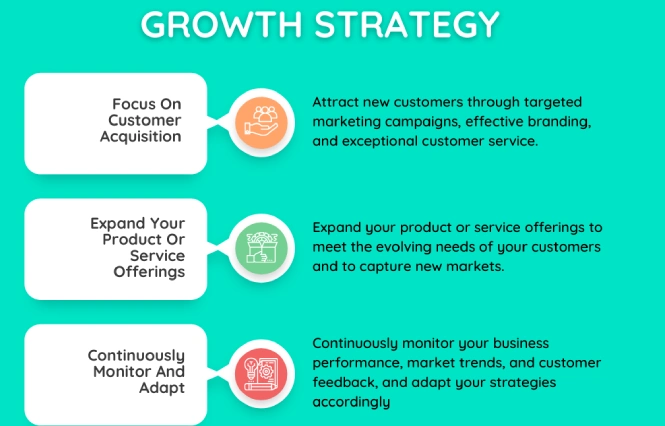Effective Business Growth Strategies
In today’s competitive marketplace, understanding effective business growth strategies is essential for companies to thrive and expand. Whether you are a small business owner or running a large corporation, finding ways to grow is key to success. Implementing the right strategies can help your business reach new heights while staying ahead of the competition
What Are Effective Business Growth Strategies?
Effective business growth strategies are essentially methods and plans that businesses use to expand and increase their market presence.
Typically, growth strategies can involve targeting new customers, improving products, or expanding into new markets.
Moreover, successful companies often utilize a combination of short-term and long-term tactics to achieve sustainable growth. Ultimately, these strategies help businesses stay ahead in their industry.

Importance of Implementing Effective Business Growth Strategies
Implementing effective business growth strategies is absolutely crucial for staying competitive. Otherwise, without growth, businesses risk becoming stagnant, losing market share, and ultimately failing.
Therefore, by focusing on strategies that enhance customer acquisition, increase brand visibility, and improve operational efficiency, businesses can thrive in an ever, changing market.
Furthermore, transitioning from a small business to a medium or large company often requires a careful blend of innovation along with expansion tactics. Consequently, the successful implementation of these strategies can lead to sustained growth and success in the long term.
Types of Effective Business Growth Strategies
Different businesses may require unique growth strategies depending on their size, market, and goals. Below are some effective business growth strategies that can be applied across various industries:
1. Market Penetration Strategies
A market penetration strategy focuses on increasing market share within existing markets. This is achieved by promoting products or services more aggressively, adjusting prices, or improving customer service.
2. Market Expansion Strategies
When businesses seek to enter new geographical areas or target different demographics, typically, they use a market expansion strategy.
In most cases, this involves studying new markets and then determining the best way to introduce products or services in those regions. As a result, businesses can effectively grow their market reach.
3. Product Development Strategy And Effective Business Growth Strategies
Another effective business growth strategy is product development. This involves creating new products or improving existing ones to meet the needs of the market. Product innovation helps businesses stay relevant and competitive.
4. Diversification Strategies
Diversification involves entering new markets with new products. It is a riskier but potentially rewarding strategy. Companies that diversify often find new revenue streams and reduce dependency on a single product or market.
Key Elements of Effective Business Growth Strategies
To ensure your effective business growth strategies work, focus on these key elements:
Customer-Centric Approach
Your customers should always be at the heart of your business growth strategy. Building strong relationships with existing customers and understanding their needs can lead to better retention rates and increased sales. .
Financial Planning
For growth to be sustainable, first and foremost, businesses must have a solid financial plan. In addition, budgeting for marketing, product development, and expansion efforts is essential for success.
Moreover, businesses should be prepared to invest in new technologies and resources that will, ultimately, support their growth.
Innovation and Adaptability,
Indeed, innovation drives growth. Businesses that constantly adapt and introduce new products or services are therefore more likely to succeed in the long term.
For example, this includes embracing new technology, adopting new business models, and staying ahead of market trends. Ultimately, staying innovative ensures sustained success.
How to Measure the Success of Your Effective Business Growth Strategies
Measuring the success of effective business growth strategies requires a combination of metrics and benchmarks. These include:
1. Revenue Growth
One of the clearest indicators of growth is an increase in revenue. By tracking sales figures, you can assess whether your strategies are helping your business grow financially.
2. Customer Acquisition Rate
Tracking how many new customers you gain over time is another key metric for determining growth. A successful growth strategy should result in a steady increase in new customers.
3. Market Share
By monitoring your market share, you can see how well your business is performing compared to competitors. Gaining market share indicates that your business is expanding effectively.
4. Customer Retention Rate
Customer retention is critical for long-term growth. A high retention rate means that your customers are satisfied and loyal, which often leads to repeat purchases and referrals.
The Impact of Customer Feedback on Effective Business Growth Strategies
Customer feedback plays a crucial role in business growth. When businesses actively seek feedback, they can identify areas for improvement.
Furthermore, listening to customer suggestions can lead to innovative ideas. As a result, implementing changes based on feedback can enhance customer satisfaction and drive sales.
Personalized Marketing Strategies for Effective Business Growth Strategies
Personalized marketing strategies can significantly boost business growth. By tailoring messages to specific customer segments, businesses can create a more engaging experience.
Additionally, using data to understand customer preferences helps in crafting effective campaigns. Ultimately, personalized marketing leads to higher conversion rates and increased loyalty.
Creating a Loyalty Program for Business Growth
Implementing a loyalty program can foster long-term customer relationships, thereby supporting business growth. For example, offering rewards for repeat purchases encourages customers to return.
Moreover, loyalty programs provide valuable insights into customer behavior. In the end, these insights help refine marketing strategies and improve overall customer retention.
Common Challenges in Implementing Effective Business Growth Strategies
While implementing effective business growth strategies, businesses may face various challenges:
1. Market Saturation
In highly competitive markets, it can be difficult to differentiate your product and capture a larger share of the market. This often requires innovation and creative marketing techniques.
2. Financial Constraints
Expanding a business requires capital. Without proper financial planning, growth initiatives may fail to get off the ground.
3. Resource Management
Growth requires more resources, including employees, materials, and technology. Managing these resources efficiently is crucial to avoid bottlenecks that can impede growth.
4. Changing Consumer Preferences
Consumer preferences can change quickly, which makes it important to stay in tune with your target audience. Businesses must remain flexible and adapt to these changes to stay relevant.
Effective Business Growth Strategies for Small Businesses
Small businesses often face unique challenges when growing. Below are some effective business growth strategies tailored for small companies:
1. Leveraging Digital Marketing
Digital marketing, including social media and search engine optimization (SEO), offers affordable ways for small businesses to reach a wider audience.
Creating engaging content, running targeted ad campaigns, and maintaining a strong online presence can drive growth.
2. Building Partnerships
Collaborating with other businesses can open new opportunities for growth. Partnerships allow businesses to expand their reach, share resources, and offer joint promotions that benefit both parties.
3. Focusing on Customer Experience
Providing an exceptional customer experience is one of the most effective business growth strategies for small companies. Personalizing interactions and providing top-notch service will result in more repeat business and positive word, of, mouth.
Focus on Customer Retention for Business Growth
Why Customer Retention Matters
Keeping your existing customers happy is essential. While gaining new customers is important, keeping loyal ones is easier. Happy customers often return for more purchases.
Social Media is a Powerful Tool
Today, businesses can use social media to reach their audience. Platforms like Instagram and Facebook allow businesses to promote products. When done right, it can significantly boost growth.
Creating Engaging Content
Posting content that grabs attention is key. To succeed, make posts that encourage likes, shares, and comments. Moreover, offering promotions through social media can increase engagement. Always be consistent with updates.
Expand Your Product Line for Effective Business Growth strategies
Introducing New Products for Business Growth
Expanding your product line can lead to growth. Adding new items can attract a larger customer base. However, it’s important to ensure these products meet the needs of your audience.
Testing the Market First
Before launching new products, test them. By doing this, businesses can identify potential problems early. Gathering feedback will also help refine your offerings. In the end, a successful launch can fuel growth.
Build Strategic Partnerships for Business Growth
Why Partnerships Work
Collaborating with other businesses can help you grow. A strong partnership allows both businesses to benefit. For example, companies can share resources and reach new audiences together.
The best partnerships involve businesses with similar values. Trust and communication are also key. Both parties should be clear about their goals to ensure mutual success.
Invest in Employee Development
How Training Helps Growth
Investing in your employees is important for business growth. Employees with the right skills work more efficiently. Additionally, training makes them feel valued and motivated.
Offering Continuous Learning
Always encourage your staff to learn new skills. For instance, you can provide workshops, courses, or mentoring opportunities. Not only does this improve their performance,
But it also leads to innovation in your business. Ultimately, fostering a culture of continuous learning benefits both employees and the organization as a whole.
Use Data-Driven Decisions
The Power of Data
Businesses that make decisions based on data tend to succeed. In addition, collecting data helps businesses understand their customers better.
For example, analyzing trends can reveal what products are popular. Furthermore, this insight allows companies to tailor their offerings to meet customer needs effectively..
Implementing Data Insights
Once data is collected, the next step is to use it to improve strategies. For instance, data can show which products need improvement or highlight new market opportunities.
As a result, this allows businesses to adjust their approach effectively to drive growth. Consequently, leveraging data is crucial for informed decision-making.
Optimize Your Online Presence for Business Growth
Why Online Presence Matters
In today’s digital world, being online is vital. Moreover, customers often research companies online before making purchases.
Therefore, a well, designed website can boost credibility and attract visitors. Ultimately, having an appealing online presence is essential for success.
Q 1: What are effective strategies for business growth strategies?
Effective strategies for business growth include expanding your product line, leveraging social media marketing, and building strategic partnerships.
Q 2: Why is customer retention important for effective business growth?
Customer retention is crucial for business growth because it costs less to keep existing customers than to acquire new ones. Happy customers are also more likely to make repeat purchases.
Q 3: How can I measure the success of my business growth strategies?
You can measure success by tracking key performance indicators (KPIs), such as sales revenue, customer acquisition costs, and customer satisfaction levels.
Q 4: What role does social media play in effective business growth?
Social media plays a significant role in business growth by helping companies reach a wider audience and engage with customers effectively.
Q 5: How can expanding my product line contribute to business growth strategies?
Expanding your product line can attract new customers and increase sales from existing customers, thus contributing to overall business growth.
Q 6: What should I consider when choosing strategic partners for effective business growth?
When choosing strategic partners, consider their values, communication style, and how well their goals align with yours for mutual success.
Q 7: How can I improve my online presence for business growth?
To improve your online presence for business growth, focus on having a user-friendly website, engaging content, and active social media profiles.
Conclusion:
Businesses must employ effective business growth strategies to ensure long, term success. Whether it’s through market penetration, product development, or innovation, the right strategies can indeed help businesses grow sustainably.
By staying customer-focused, adapting to market trends, and managing resources efficiently, businesses can support their growth efforts.
Additionally, by overcoming common challenges and measuring success, businesses can continue to thrive in any market environment..
